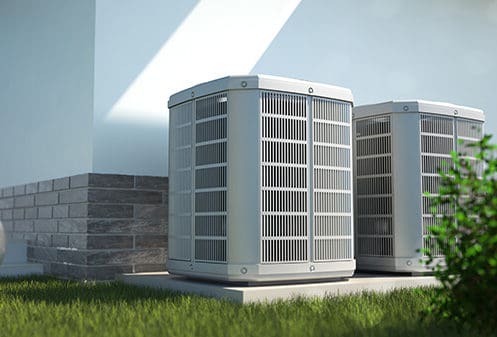Essentially, a heat pump transfers heat from one place to another. It is often used in apartments and smaller spaces to control the temperature, but there are a lot of advantages of heat pumps. Their primary advantage is that they can function as both a heating and a cooling unit equally effectively.
Unlike a furnace, a heat pump doesn’t create hot air; it simply transfers heat from the outdoor air into your home. It also works in reverse in the summertime. The heat pump takes cool air from outside, brings it into your home, and blows hot air from inside your home outside.
A typical residential heat pump uses electricity to power its compressor, which compresses refrigerant gas that has absorbed heat into a liquid form. The liquid then travels through tubing to an expansion valve where the pressure drops. This causes some liquid refrigerant to evaporate into gas form, allowing it to absorb more heat when it passes through another coil in the outdoor unit before returning indoors as compressed gas.
Key Elements of a Heat Pump System
A heat pump requires a number of parts to function. There are two basic units to a heat pump, however: the outdoor unit and the indoor unit. The compressor, condenser, and evaporator coil are all housed in the outside unit. First, the compressor compresses the refrigerant vapor. Next, the condenser coil cools the compressed refrigerant vapor to become liquid again. Finally, the evaporator coil evaporates, or liquifies, refrigerant to absorb heat from inside your home or business.
The indoor unit contains an expansion valve, reversing valve, and evaporator coil. These components control how much refrigerant flows through the system depending on whether you want heating or cooling output. For example, when selecting the heating mode, the expansion valve allows more liquid refrigerant into the outdoor unit. In contrast, the reversing valve stops liquid from entering the outdoor unit when the cooling mode is selected.
The refrigerant is the heart of the system. It absorbs heat from the outside air and transfers it indoors to cool the house. The refrigerant releases heat into the house when you want to heat your home.
The compressor compresses refrigerant that was vaporized by a heating coil into a high-pressure liquid. The compressed liquid then goes into an expansion valve where it expands and becomes a low-pressure gas, which is then sent through another heating coil to warm up the air inside your home.
This valve diverts the cooled refrigerant back to the outdoor unit when the unit is in heating mode. When it gets too cold inside your home, the valves allow it to repeat its cycle of cooling down the indoor air temperature until it reaches whatever temperature you’ve set on the thermostat.
When the cooling mode is selected, this valve diverts heated refrigerant from an outdoor unit back into an indoor coil or pipe for use in the heating mode. This way, it can repeat its cycle of heating indoor air temperature until it reaches your desired temperature.
Another great thing about heat pumps is that they can be used with geothermal systems. These use the ground as a heating or cooling source, transferring heat from the ground into your home. Even if it’s cold outside the ground stays fairly warm below the surface. Geothermal heating systems can save the average household 30-60% on energy costs. They are also awesome at controlling humidity, which is a big plus for an oceanside region like Charleston. Geothermal units can also transfer heat between your home and a nearby body of water, such as the Atlantic, which is a great fit for Charleston residents.
Benefits of Using a Heat Pump
The pumps have many advantages over other types of heating systems. Heat pumps use less electricity than traditional furnaces and central air conditioners, making them cheaper to run. You’ll also save money because they’re smaller and more efficient than other heating systems.
Heat pumps run on electricity. Because they don’t require a special fuel like gas or oil, they’re more energy-efficient than other furnaces, especially those that use natural gas or propane as their primary fuel source. Also, you can add a heat pump to your home no matter where you live. However, if your comfort control system is powered by gas or propane, you may have a difficult time running it. Not all areas of South Carolina are serviced by a natural gas company, and propane delivery can get expensive. Electricity, however, is in ubiquitous supply.
Heat pumps run more smoothly and quietly than other heating systems. There is no ductwork involved that can come loose, and there’s no cavernous HVAC unit in your basement or closet that sounds like shoes in a dryer when it kicks on and off. Heat pumps are also discreet and can be customized to match your decor.
Because heat pumps don’t use flammable fuels such as oil or gas, there’s no risk of fire or explosion like traditional boilers and radiators. You will never smell gas or have to worry about yourself or your family falling victim to carbon monoxide poisoning because heat pumps do not use combustion.
Heat pumps can cut carbon dioxide (CO2) emissions by up to 90%. They’re one of the most effective ways to reduce your carbon footprint.
Heat pumps are designed to last decades without major problems; many come with up to 10-year warranties. It’s common for heat pumps to last 15-20 years, which is a substantial contrast to your typical HVAC unit that lasts about 10-15 years. Geothermal heat pumps can last a whopping 25-50 years!
In addition, heat pumps are easy to maintain, with simple checks that can be carried out regularly by a trusted tech from Charleston Heating and Air. There aren’t a lot of parts to check, so the tune-up is a breeze.
Other Considerations
While heat pumps are an amazing it of technology, there are a few things that you’ll want to consider before you call up a tech from Charleston Heating and Air to install one for you. Heat pumps are not as straightforward to install as simple radiators or boilers. You will need professional help from a qualified heating professional if you want your heat pump to work effectively and efficiently.
Although they use less fuel than traditional heating systems, heat pumps are not entirely carbon-neutral because they require electricity generated at power stations that emit CO2 emissions into the atmosphere. However, this can be reduced by using renewable energy sources like solar panels or wind turbines when generating electricity for your home.
Heat pumps require regular maintenance checks to work efficiently and safely. This is especially used throughout the winter when there may be more snowfall or icy conditions affecting outdoor areas where pipes and hoses may freeze up if not kept warm enough through the cold weather conditions.
At Charleston Heating and Air, we offer various services to help you maintain your HVAC system. In addition, we will ensure that you receive the best quality service at an affordable price for other services, including plumbing and electrical services. Our highly trained technicians can repair any system. In addition, we are experienced in handling all makes and models. We offer prompt service to all our customers in the Charleston area, so you can count on us to be there when you need us. Contact us today or visit our website for more information.

